Great Lakes Nitrous Brawl 2018
What does it take to beat the #1 qualifier in the 8.60 index series, a 96 ZR1 Corvette with a detuned 632 ci power plant and Equipped with a Midwest Converters ProGlide and a 2nd generation “Reactor Torque Converter™” w/the Ultra Damper.
Well to beat a 8.601 on a 8.60 index with a .023 light, it’s got to be great. And only another Midwest Equipped car belonging to Mark Zierer, equipped with a Pro 8 Midwest Torque Converter, could get the job done. Midwest Converters, clearly gives racers an advantage. More power, better consistent reaction times, higher MPH with less heat and less torsional vibration. More to come about these amazing converters.
Midwest Reveals New “Variable Torque Control™”
Midwest Converters has released a new device to control torque converter torque transfer on launch. This new VTC™ is controlled by their new Aluminum Transbrake. This is not a converter dump! This is a true Torque Controller.
It can be added to your own transbrake also. Available for PG, Turbo 350 and TH400. No additional wiring , solenoids or timers needed. Simply apply the brake and the VTC™ will limit converter torque , allowing higher launch stall speed without blowing the tires off. Easier on the drive train with less strain on the entire transmission.
This also allows better hole shots for turbo cars, allowing the turbos to spin-up quicker with better hook-up on the big end! Great for small tire cars too, that have limited tire traction. Contains a safety by-pass valve to prevent excessive crankshaft end thrust due to excessive converter pressure as a bonus feature! Must use a deep aluminum pan. Production is limited due to high demand. Call for more info@ 815-229-9808, ask for Dennis Sneath.
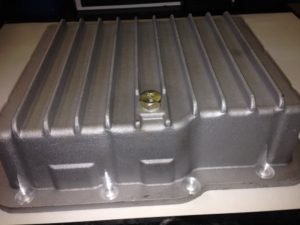
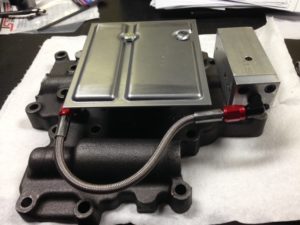
Midwest VTC Powerglide Transbrake
Midwest Converter’s “Ultra Damper Converter™ “
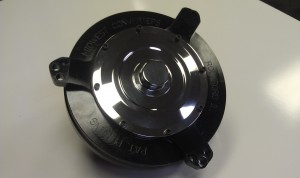
Midwest Ultra Damper Converter
Midwest Converters, Rockford, IL. UltraDamper Converter 2.0
by Arthur Lehman
By now most racers have heard of or maybe purchased a Midwest Ultra Damper Torque Converter. Well, Midwest has asked me to report on their success in controlling Torsionally Induced Vibration within a racing torque converter and transmission.
First let’s explain how torsional vibration, or torsionally induced vibration, (TV or TIV for short) is created and what effect it has on a racing transmission/converter. All machines such as air compressors, engines, transmissions, even a rock, have natural harmonics or frequencies. A rotating assembly, such as an engine, produces an unnatural harmonic frequency due to the compression and ignition cycle of combustion and is controlled by the harmonic balancer or damper. A transmission and the torque converter both produce these harmonics, left unchecked, can cause quite severe damage to itself. If you wonder how these harmonics are created, read on. TORSIONAL INDUCED VIBRATION or TIV as I have fondly named it, is created by every compression cycle of the front transmission pump, rotation of the planetary gears, clutch engagement and release cycle and such. Torque converters create their own harmonics from rotation and fluid directional impact, and torque multiplication within itself. An example of unchecked TIV can be observed by inspection of the inside contact point on the pump gears with the converter drive hub. Every revolution of the gear produces 20 to 30 impulses do to oil compression and release. The evidence is shown on the premature wear found on both parts, leading to unstable positioning of the pump gear with a high rate of failure ahead. The problem is not so well defined on a stock OEM transmission and converter, but when transmission line pressures are raised such as found in any racing transmission the problem starts to develop. Add in a firmer SFI certified flywheel thats is about 30% thicker and stiffer and the problem can quickly be identified. Add in the other factors found inside a converter and inside the transmission itself and it is clearly a major concern. The higher RPM’s, increased engine HP and torque and we have the “Perfect Storm” developing. How can you prevent this phenomenon? Midwest has solved this problem with one answer. The Ultra Damper Converter™. More on this article soon
by Arthur Lehman
Midwest Converters Expands Product line again!
Midwest Converters has expanded its product line by adding a 7 inch Pro Series converter, featuring a light weight stator, light weight front mounting cover along with an UNBREAKABLE 26 element sprag assembly, made from Midwest own GEN III™ Steel, the strongest, toughest steel made. Available for all small block GM, Ford, Chrysler, Toyota and Mitsubishi transmissions.
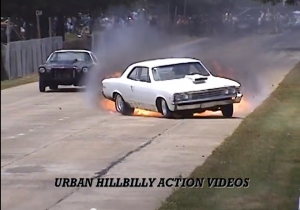
Fire after transmission explosion , don’t let this happen to you, use Midco Maxx FR, fire retarded ATF
Midco Maxx FR ™
Fire Resistant Racing ATF
Product Description
Readily biodegradable Midco Maxx™ FR is a specially designed fire resistant transmission fluid for use in racing or competitive automotive applications. This premium lubricant begins with naturally high viscosity index base oils for temperature shear stability and is formulated with our advanced HeatGuard™ special additive technology. The Midco Maxx™ FR innovative formula has vigorous EP/anti-wear inhibitors resulting in wear reduction for friction materials, such as bands, clutch plates, steel, brass, and bronze parts. An exceptional anti-rust and anti-oxidation additive has been included to significantly limit rusting of ferrous and corrosion of yellow metals. In addition, the robust Midco technology improves demulsification, provides hydrolytic stability and greatly reduces foaming. Certain manufacturing and some environmentally sensitive applications require that transmission oils contain no metal additives like zinc and is low in calcium. These oils are still required to meet the stringent testing limits imposed on performance-based formulations. This environmentally responsible zinc-free formula is truly designed for the safest conditions. Features and Benefits UPDATED 8/24/18
- Non-Toxic!
- Naturally high viscosity index base oils provide temperature shear stability and fire resistance
- Excellent Temperature and Shear Stability
- Demulsifies! Provides Hydrolytic Stability!
- Limits foaming!
- Readily biodegradable, safer for incidental track oil down.
- If required, Simple track clean up with a quick wipe of methanol and the track is dry. Track owners benefit from the quicker easier clean-up and MaxxFR will not effect asphalt.
- HeatGuard™ EP/anti-wear technology, reduces and disperses heat.
- Zinc Free, Calcium Free Product
- Exceptional anti-rust and anti-oxidation additives prevent rusting of ferrous metals and corrosion on aluminum and yellow metals.
- Avoid accidental fires like shown above after a transmission explosion.
- UPDATE !
- Due to fire concerns with all Racers, Maxx FR has had a great responce and unexpected demand. Midco will provide faster delivery in 2019, with increased production, at even a lower price.
Midco Lubricants, a division of the MW Group Inc ,
Midco Maxx FR™
All Rights Reserved. Applies to Midco Maxx FR ™
Contact info:
815-229-9808
Midco Lubricants
3631 Mansfield Street
Rockford, Illinois, 61109
Midwest Converters, Rockford, IL.
Sees Another Victory
by Arthur Lehman
Last month, I reported on a growing interest from drag racers at the Byron Dragway, located in Byron, Illinois. It had seemed to be focused on a small group of racers huddled around a Chevy Cobalt racecar. The cars owner from Wisconsin had done 2 shakedown runs, a .703/196 mph and a .710/196 mph back to back. The car was testing a Reactor torque converter, one of Midwest’s Converters most popular big horsepower converters. The numbers were all that were expected with fewer than 4% slippage at 7400 rpm. Midwest owner and seasoned drag racer Dennis Sneath said “ the car would be back to try another converter in a couple weeks, make sure to be here, I know you will be surprised.”
Well back we are, and expectations are high. But where was the Cobalt? Almost 11:00 a.m. and the track temperature was rising. 12:45 and the car finally shows up along with a small entourage of racers. Midwest Converters had supplied the Cobalt’s owner with a new converter, the Midwest Ultra Damper converter. This is the same Reactor converter previously used; only with the new, Patent Pending designed Ultra Damper, an integral part of the billet front cover containing a high viscosity damper assembly. Midwest claims it will increase mph and lower the E.T.’s both while reducing torsionally induced harmonics and saving wear on the transmission. Well, it’s almost 2:00 p.m., temperature is up and the air is getting worst by the hour. The Sunset Racing motor, a 632 ci, sounds awesome, as they get ready for the burn out. The Cobalt leaves in a spectacular hole shot as we wait for the results. Wow, a .682@ 203 mph. Given a 10-minute cool down another pass was attempted. OMG! A .676@205mph. I had to talk to Mr. Sneath. After a few pats on the back to everyone, I asked Sneath what this new torque converter was about. He said, “it’s all about energy. Energy can either be good and constructive or bad and destructive. We simply have taken loss energy created by torsionaly induced harmonic vibration and converted it to a positive.” I asked what that means in English? “Simply said bad vibrations simply lower the efficiency off the transmission, just like a harmonic balancer on an engine. A balanced and smooth turning engine is much more efficient than one with vibrations. Until this time no one has been able to detect, measure and remove the harmonics, generated by tortional pulses from a transmission pump and planetary gears. We use an on board receiver capable of recording 288 channels of data on one pass down the track. We can even detect differential noise, wheel bearing temperature and driveshaft harmonics. We can measure frequencies as they change with RPM’s and during shifts. Until this time, testing has been in house and kept quite secret”. Sneath continued to explain how racing transmissions typically have increased pump pressures, rigid, stronger input shafts, and straight cut teeth planetary gears, that each can set up different levels of torsionally induced harmonics that can influence a transmissions performance and durability. Many race cars require the use of a SFI, certified flywheel (flex plate) that is quite stiff compared to OEM equipment, adding to the harmonics and torsional vibrations. Sneath also closed our interview with a brief insight of how Midwest Converters has developed the strongest steel available anywhere, Gen III™ Steel, to be used in this new converter. Sprag races, used as a one way clutch, and splined turbine hubs are now using the same Gen III™ steel. Gen III™ Steel is cleaner and stronger than typical 9310, 52100, 8620 or any other alloy steel such as 4340 or4140. Gen III™ Steel offers over 25% greater tensile strength, double the heat resistance, and a greater wear protection. Typically, Gen III™steel is used in turbine drive hubs, sprag and bearing races, input and output shafts and gear train. It has been called “ The Toughest Steel in the Industry” See our separate data sheet for info about Gen III ™Steel. If you would like more information about any Midwest product, feel free to call
Dennis Sneath @Midwest Converters,
815-229-9808
Read more about GEN III™ steel below
GEN III ™
SUPER ALLOY STEEL
When it comes to the strongest, toughest steels, think Super Alloys.
When it comes to the strongest, toughest torque converters,
think Midwest Converters.
Midwest Converters, along with Midwest Metallurgy, are part of the MW Group Inc. located in Rockford, Illinois. Midwest Metallurgy, and Midwest Converters are responsible for the development of the newest Super Alloy steel, Gen III™ steel. The Super Alloy steels category is reserved for the elite top performing steels, some are not yet listed in the standard AISI/SAE heat treatable steels. Next, are Performance Alloys such as 52100, 9310, and 300M. These are great performing alloys that resist deformation and wear well above traditional alloys steel, and are usually quite friendly to heat treating and tempering to create hard wear resistant surfaces. There are also Alloys Steels, such as 4130, 4140, 8620 and such, which are just that; traditional alloy steels. The newest Super Alloy steel, Gen III™, steel was developed after the need was realized by Midwest Converters when previously designed materials failed and were deemed inadequate, and further analyzed for root failure analysis. Big words for “why did it fail?” Was it lacking high fracture toughness or bending fatigue resistance? Was the % of elongation a consideration? Each aspect of failure was carefully examined and corrected until the highest performing steel was created. Samples were produced and tested. As predicted after several hardening, tempering and formulation processes were altered, perfection was finally achieved. The first part Midwest soon produced was a fully encapsulated outer sprag race for the popular 8-inch torque converter using the Gen III™ steel. But before we reveal the test results it is important to have an understanding of the outside influences thrown at a sprag assembly. It is more than torque, horsepower and shock; it is also the thermal resistance temperature. As the temperature climbs closer to the original steels tempering temperature, it starts to loose its ability to hold shape and size. This is one area that Gen III™ steel really shines. Gen III™ steel is tempered at upwards of 1100°F, nearly 3 times the temperature than conventional 9310 or 8620, meaning that it far out performs these performance alloys thermal resistance for use as gear and shaft materials. Simularly, the core hardness also exceeded all other steels including the “Nasa” designated steel with a core hardness of 52-56 rc and a tensile strength of over 300 ksi. By the way, the Midwest sprag out performed previous materials by at least 23% and more in all testing. Gen III™ steel machines beautifully similar to other alloys and responds quite well to REM™ isotropic finishing. Due to the small batches that Midwest produces, high quality can be maintained. Although small batches cost more and delivery time can be delayed from Mexico. The finished product is well worth the extra cost and wait. 4-6 weeks have been the normal expectation with improved shipping predicted in the near future. Midwest can issue interested partners with a licensing agreement and heat-treating instructions start to finish that selected heat treaters can perform. Contact Dennis Sneath @ 800-554-2668 for more information. Gen III™ steel and REM™ are trademarks of the MW Group Inc and REM surface refinishing respectfully.
Well, it Just Keeps Getting Better !
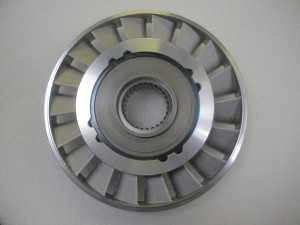
Midwest Unbreakable Sprag along with a Sonnax stator
Midwest never stops making a good product even better. Now Midwest has combined their Super Alloy GEN III™ STEEL sprag assembly with Sonnax’s High Performance Stator as a drop in for all racing applications utilizing a 245mm core. The results are over 30% more load carring capacity and will not break under even the highest loads. Read more about the GEN III ™ Steel in the above above article. Gen III™ steel is a trademark of the MW Group Inc.
Well, it Just Keeps Getting Even Better!
What can possibly be better than the Gen III™ steel? How about an outer sprag race, using GEN III™ STEEL equipped with a 48 elements sprag. More than twice the number of any other racing converter. Gen III™ steel is a trademark of the MW Group Inc. Capable of 1600 ft lbs of torque!



